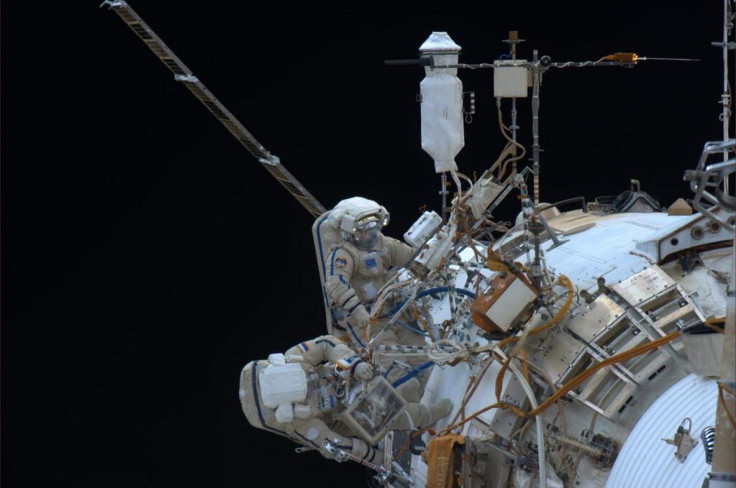Russian Cosmonauts Installed Earth-Watching Cameras In A Record-Breaking Spacewalk, But Removed Them Later Due To Technical Glitch

Two Russian cosmonauts on Friday set a Russian record for longest spacewalk, when they installed two new cameras on the international space station, and later removed them as the devices failed to operate due to an unspecified technical glitch.
Commander Oleg Kotov and Flight Engineer Sergey Ryazanskiy began their spacewalk from the station’s airlock at 8 a.m. EST, to install two cameras, and to update several other scientific instruments secured to the exterior of the Russian segment of the station. The new cameras were designed to send high-resolution video and still images of Earth, captured from the space, for the Canadian company UrtheCast.
In the first part of their planned seven-hour spacewalk, the cosmonauts installed a high-definition video camera on a swiveling platform and installed a second medium-resolution camera for still snaps. However, the devices failed to send signals to Earth due to an unknown glitch, and the cosmonauts brought the camera units back to the station for further analysis.
"It appears that we have seen an unsuccessful attempt at bringing those two cameras to life," NASA spokesman Rob Navias said, in a spacewalk commentary. "The exact cause of the problem is not known at this time."
In addition to the camera work, cosmonauts also removed a Vsplesk experiment package and replaced it with hardware for a more sophisticated earthquake-monitoring experiment, Seismoprognoz, which they attached to a Zvezda handrail, NASA said, in a statement.
The glitch and the subsequent extra work consumed cosmonauts’ time, and they could not complete all other tasks originally slated for Friday’s outing. The cosmonauts also spent about eight hours working outside the space station -- setting a new record for the longest spacewalk by Russians.
The installation was part of UrtheCast project to provide high-resolution images of Earth to its customers via the Internet. UrtheCast also planned to distribute some of the imagery for free to the public through its web platform. The near real-time streaming from the two cameras was set to begin by early 2014, the company said.
"UrtheCast's two cameras will stream unprecedented footage of our evolving Earth to anyone with an Internet connection," the company's website said. "In near real-time, you will be able to visit your favorite locales and learn about current events as they unfold."
Vancouver-based UrtheCast had entered an agreement with the Russian space agency to provide rights to use images and videos taken over Russia, in exchange for installing cameras in the Earth-orbiting station. UrtheCast holds commercial rights for the imagery for the rest of the world.
The cameras were originally planned for a mid-October launch from Earth, but was delayed until Nov. 25, to accommodate the first-ever journey of the Olympic torch into space.
Friday’s spacewalk was the third in a week by the ISS crew. NASA astronauts Mike Hopkins and Rick Mastracchio replaced a refrigerator-sized faulty coolant pump with a spare unit in two spacewalks conducted on Dec. 22 and Dec. 24.
© Copyright IBTimes 2024. All rights reserved.












